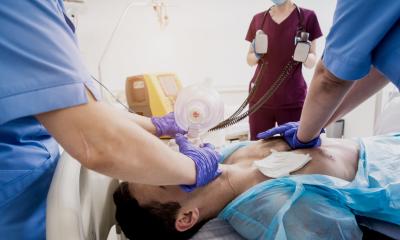Poor sleep: Increased risk of heart attack and stroke
EuroHeartCare is the official annual meeting of the Council on Cardiovascular Nursing and Allied Professions (CCNAP) of the European Society of Cardiology (ESC). The 2015 meeting is held 14 to 15 June in Dubrovnik, Croatia, in collaboration with the Croatian Association of Cardiology Nurses.

Prof. Gafarov said: "Mortality from cardiovascular diseases accounts for nearly 50% of the total mortality among the population. Nearly 80% of deaths from cardiovascular disease are due to myocardial infarction (heart attack) and stroke. It means that today we are talking about an epidemic of cardiovascular disease. It is therefore necessary to engage in intensive prevention of risk factors leading to the development of cardiovascular diseases."
He continued: "Sleep disorders are very closely related to the presence of cardiovascular diseases. However, until now there has not been a population based cohort study examining the impact of sleep disorders on the development of a heart attack or stroke."
The research was part of the World Health Organization (WHO) programme "MONICA" (Multinational Monitoring of trends and determinants in Cardiovascular disease) and the "MONICA-psychosocial" substudy. It investigated the relationship between sleep disturbances and the risk of developing a heart attack or stroke in the long-term.
The study included a representative sample of 657 men aged 25 to 64 years with no history of heart attack, stroke or diabetes in Novosibirsk, Russia. Sleep quality was assessed when the study began in 1994 using the Jenkins Sleep Scale. Very bad, bad or poor ratings were considered a sleeping disorder. Cases of myocardial infarction and stroke were recorded over the next 14 years.
During the study period, nearly two-thirds (63%) of participants who had a heart attack also had a sleeping disorder. Sleeping disorders are closely associated with negative affective states (anxiety, depression, hostility, vital exhaustion). They are connected with the social gradient and are a manifestation of social stress in the population.
Men with a sleeping disorder had a risk of myocardial infarction that was 2 to 2.6 times higher and a stroke risk that was 1.5 to 4 times higher than those without a sleeping disorder between 5 and 14 years of follow up.
Gafarov said: "Sleeping disorders were associated with greatly increased incidences of both heart attack and stroke. We also found that the rates of heart attack and stroke in men with sleeping disorders were related to the social gradient, with the highest incidences in those who were widowed or divorced, had not finished secondary school, and were engaged in medium to heavy manual labour."
He added: "Sleep is not a trivial issue. In our study it was associated with double the risk of a heart attack and up to four times the risk of stroke. Poor sleep should be considered a modifiable risk factor for cardiovascular disease along with smoking, lack of exercise and poor diet. Guidelines should add sleep as a risk factor to recommendations for preventing cardiovascular disease."
Gafarov continued: "For most people, good quality sleep is 7 to 8 hours of rest each night. People who are not sleeping well should speak to their doctor. Our previous research showed that sleeping disorders are very closely connected with depression, anxiety and hostility, so speaking with a psychologist may also help."
Source: European Society of Cardiology
16.06.2015











